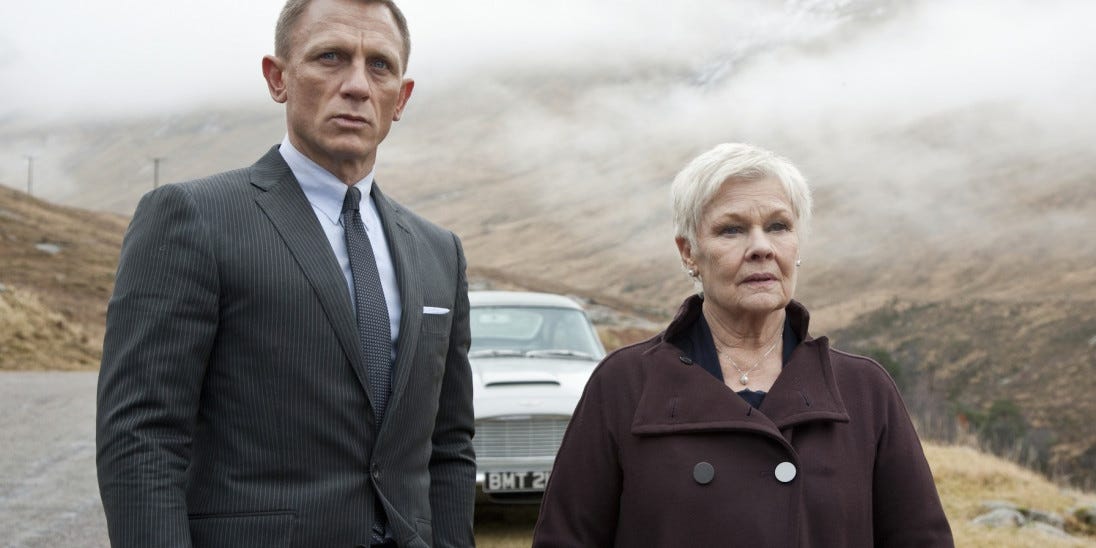When it comes to the best James Bond movies from the Daniel Craig era, the debate usually revolves around Casino Royale vs Skyfall. Quantum of Solace was too messy, SPECTRE too focused on its dreams of sequel-building grandeur and No Time To Die too long and self-satisfied. So Casino Royale, which super-charged 007 with an origin story that revitalized the “misogynist dinosaur” as M had called him a decade earlier in GoldenEye, and Skyfall, which took the immortal nature of the character and imbued it with the pathos of age and desperation, remain locked in battle for the top position.
Though I prefer Casino Royale in the long run, Skyfall is particularly interesting because it turns 10 this week and the moment that it was birthed in has gone through multiple cycles of relevancy. When interviewed in 2012, director Sam Mendes stated that The Dark Knight, the blockbuster smash hit that forever changed the way we critically and culturally interact with superhero films, had been a particular influence on Skyfall: “What Nolan proved was that you can make a huge movie that is thrilling and entertaining and has a lot to say about the world we live in, even if, in the case with The Dark Knight, it’s not even set in our world. That did help give me the confidence to take this movie in directions that, without The Dark Knight, might not have been possible.”
Since then studios have embraced and and rejected the most simplified form of this idea numerous times, bolstered by a fandom that rides the waves of constant reboots. “Yes, it’s better when things are realistic and gritty” flip flops to “Actually, why should things be this sad?” depending on the quality of the movie that the argument was last attached to. When Henry Cavill recently announced his return to the role of Superman, he did so with a statement of “But the most important thing, which I will be aiming for, is for the audience to leave the cinema and to feel like they can fly, to feel like they can protect, and to feel like they want to give to everyone else.”
It’s a far cry from Cavill’s statement in 2013 promoting his first go-round in Man of Steel: “Growing up being so very different and not knowing why… that would be petrifying and lonely.” But the character changes and the tides of studio desire wash out. Now, hearing someone like Damon Lindelof say “We're looking at a movie like The Dark Knight, which went one step beyond Batman Begins…It was really about something, and at the same time it was a superhero movie,” about their Star Trek sequel elicits groans rather than hope. The calls of “Can the next James Bond be a little more fun?” have already begun to echo, breaking down cinema into palatable “joy” and tasteless “grimness” in a way that does no favors to art in the slightest.
So how does Skyfall stand today? It certainly does seem to take obvious cues from The Dark Knight and its spawn - Bond is broken down physically and emotionally, facing a villain that wishes to see the entire structure that would support him violently dismantled. That last bit is probably the one thing that the films in this wave most have in common (Hard to find the bleak, “real world” struggle in Star Trek Into Darkness when the ending has devolved into Spock and Khan fist-fighting on a spacecraft in a battle between themselves and the movie’s own editing.) They’re all based around how easily collapsible the frame of these entire narratives are - Gotham’s finest are easily manipulated, MI6 is rife with personal vendetta and deceit, Starfleet is, umm, pretty dumb, etc.
It’s a pretty easy set-up: “What if background good thing for the protagonist is actually bad?” But I think Skyfall’s attempts to distill its themes down to an ultimately personal level sets its apart from its status as “The Dark Knight of James Bond movies.” While The Dark Knight certainly climaxes with very intimate stakes (I don’t know of another big budget movie since that’s found its climax in a villain closely holding a handgun to the head of a child of another lead character. Could be wrong though as I haven’t seen Thor: Love and Thunder yet,) but it’s immediately swept up in that series’ idea that Batman is symbolically bigger than Bruce Wayne. The hero is equipped to shoulder all of the hard things that a normal man cannot. Skyfall, on the other hand, argues that 007’s problems are James Bond’s problems and that one can absolutely crush the other.
There is no Alfred Pennyworth advice of “Endure” to be found in Skyfall, for the soul of the United Kingdom lies in the balance or whatever. Rather it squeezes the poison out of the most distant elements of the series (The Machiavellian enemy, the bureaucratic leadership, the unkillable secret agent with no past or future) and allows Bond to truly reboot himself and his motivation by the end. I’d argue that it’s honestly about as “happy” of an ending as the franchise deserves.
Shame about SPRECTRE, though.


Hooooooow is this movie already ten years old?